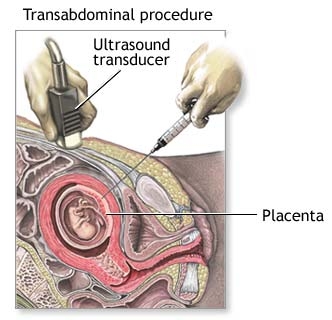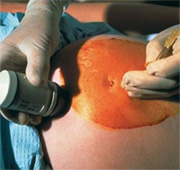Chorionic Villus Sampling
Chorionic Villus Sampling, What Is It And Does it Effect You? Chorionic villus sampling (CVS) is a test which is performed to identify a number of different genetic problems – including Down syndrome This test is performed by using a tin tube which is guided through your cervix or by using a thing needle which is inserted into your uterus. Your health care provider will then take a sample of chorionic villi from the placenta. The Chronic villi have the same genetic makeup as your baby and are responsible for transferring nutrients, oxygen and antibodies from you to your baby.…
Downs Syndrome
Using Ultrasound To Determine Down Syndrome First and foremost, it is important for you to realize that an ultrasound cannot diagnose Down Syndrome. Why? Well, the answer to this is easy: Down Syndrome is a chromosome disorder and is impossible for ultrasound to determine any chromosomal dysfunction of any kind. The only method which can be used to confirm Down Syndrome is through a genetic test such as amniocentesis or chorionic villus sampling. So, then why this article? Although an ultrasound cannot diagnose Down Syndrome, it can be used as a tool to look for signs that there may be…
Amniocentesis
Amniocentesis Pregnancy Test During an amniocentesis test a small sample of amniotic fluid which surrounds the fetus is removed and examined, usually to diagnose or rule out the possibility of birth defects and other complications. An amniocentesis is usually carried out around 15-18 weeks. Amniocentesis is the most common prenatal test used to diagnose chromosomal and genetic birth defects which lead to Down Syndrome. There is another test which is also used known as chorionic villus sampling (CVS), which can also be used to diagnose most, but not all, of the same birth defects as an amniocentesis. This test is…
Alpha Fetoprotein
Alpha Fetoprotein in Pregnancy Now that you’re transitioning into your second trimester, you’re probably scouring the internet for everything you need to know (and probably some things that you don’t need to know) about the next three months of your pregnancy. Morning sickness symptoms are likely to fade and the “baby bump” will start to appear. You may start feeling your baby move and will soon be making a trip to your obgyn to find out the gender (unless you plan to be surprised). One of the other things that is important to know about during your second trimester is…
Ultrasound
Ultrasound Pregnancy Test An ultrasound is one of the most useful diagnostic tests your healthcare provider will use to evaluate your pregnancy, and try to establish whether there are any possible complications in your pregnancy. Ultrasound involves the use of high-frequency sound waves, which are made by applying an alternating current to a transducer, which is used in conjunction with a lubricant. The transducer is passed over the abdomen and stomach, and sound waves are projected from the transducer through the abdomen into the pelvis. Different tissues of the body reflect the ultrasounds differently, and this allows us to distinguish…





